
Fortitude
Fortitude
‘I saw such deep love and compassion. From colleagues, from relatives and even patients […] I’ll never forget the first patient I looked after […] I asked if she wanted me to stay or give her some time alone […] She replied, “oh you can stay – but only if you’re not busy!” […] Her endless capacity to care about others was both heart-warming and heart-breaking at the same time.’
AB, nephrology consultant, London
As a vital component of their survival, wellbeing was repeatedly mentioned by healthcare workers in their survey responses.
Some people undertook reflection and daily activities to care for their own mental health. Others recall the efforts of their organisation to protect them, and to show recognition and appreciation for their work.
Many recalled learning and drawing comfort from family and patients. Moments of joy, personal resilience, and the kindness of strangers created feelings of positivity that fostered courage and helped healthcare workers to endure.
Others described how their wellbeing suffered, or how they did not consider it to be important under the circumstances. Some respondents challenge us to consider some aspects of the pandemic in new ways, and share with us how we can help them and the changes that are needed.

First anniversary of mum up north, 30 April 2020
First anniversary of mum up north, 30 April 2020
Donated by SR, diabetes and endocrinology consultant, London
Rainbows appeared in the windows of homes across the country during the pandemic. They became symbols of hope – a reminder that better things can come after a period of adversity.
SR photographed this rainbow during the first UK lockdown. It crosses Eccles New Road, a normally busy road leading to Manchester city centre. The rainbow appeared on the first anniversary of SR’s mother moving into a care home, which is located at the left-hand end of the rainbow. Salford Royal Hospital is on the right, with the distinctive curved wall. SR recalled that at this time, ‘the whole hospital was full to overflowing of very sick people’.
SR was walking to her mother’s care home ‘to have a “chat” with her through the window.’
'I] was dumbfounded when the text arrived on my phone the next day saying “you are positive, you must self-isolate”. I realised then that I had bought into the heroism dynamic, the negative side of which is the unconscious notion that “self sacrifice is acceptable” […] I realised the importance [of the] heady mix of subscribing to the idea that I could keep going on if people clapped loudly enough despite [not] thinking about my own wellbeing.’
MA, palliative medicine consultant, UK

Christmas Santa
Christmas Santa
Donated by AB, nephrology consultant, London
‘I chose [this picture] to represent the enormous generosity and outpouring of gratitude we experienced with almost too many cakes and sweets to fuel our endeavours. Many were labelled with the name of the families who made the cake and very helpfully had an ingredients list and were each individually wrapped.
‘People wanted to help in whatever way they could and being in a hospital in a position to actually help felt like a privilege. The fact too that people were thinking of our wellbeing was also soothing but in some senses gave us an increased sense of enormous responsibility to do the best we could for these lovely folk.’
Infection control nurse with Easter eggs
Infection control nurse with Easter eggs, April 2020
Donated by the Royal Hospital for Neuro-disability, London
MLM, the Infection Prevention and Control Nurse at the RHN, recalled how staff morale was boosted by a donation of Easter eggs:
‘Easter during [the] pandemic was a difficult time for our healthcare workers. Staff were working long hours, hardly seeing their families and these donations were a reminder of kindness in times of crisis. These Easter eggs cheered us up. No nurse can resist chocolates!’
'Between turning shifts [of prone patients], we chatted and ate pot noodles and too much chocolate and cakes (donated by the public) piled high in the rest areas. It was lovely to come across carefully wrapped cupcakes with messages of support from the families and often children who sent them in.’
AB, nephrology consultant, London

Thank you card
Thank you card
Donated by JB, geriatric medicine consultant, Scotland
JB received this card from a colleague at Glasgow Royal Infirmary. The message inside the card reads:
‘J[B], Thank you for everything you have done to support the patients and your colleagues over this horrid year. We’ve been so lucky both professionally and personally to have you. Thank you, Hazel x’
'I will miss the camaraderie of the hospital during the pandemic, and I have built lifelong friendships. However I am incredibly grateful to return to normality, and not to witness so much distress.’
GH, respiratory medicine SpR (specialist registrar), London

Angel card, 2020, and photograph of the card in ED’s lanyard
Angel card, 2020, and photograph of the card in ED’s lanyard, 2021
Donated by ED, respiratory registrar, south-east England
ED’s mother found this wallet greeting card in a supermarket and sent it to ED to let her know that her parents were thinking of her, and that they cared about her.
ED kept this card close to her – carrying it every day in her hospital lanyard – during the first two waves of the pandemic.
Transcript: ED talks about the angel card
ED, Angel card
My mum sent me a card just saying, ‘we’re thinking of you,’ and it was a lovely card, still got it now, though saying, ‘we’re thinking of you and we’re very proud’. I’m the only one in my family that’s in medicine so my mum and dad had obviously seen the news and seen the NHS in crisis, but they didn’t have any personal experience of it apart from through me. And so, they sent me this card and – and in it there was a little – like a credit card sized card, and it was pink and it had an angel on it. And the words on the card said, ‘Keep me close to you wherever you go, I will keep you safe.’ And my mum had seen this in the supermarket and had sent it to me. She was worried about me obviously and she wanted me to know that they were thinking about me and that they cared. And, yeah, so she sent me this little angel and as I said it was credit card sized so I slipped this angel card into the back of my ID card and I did carry it with me throughout the first and the second wave of COVID until I sent it to the Royal College of Physicians when you were asking about any memoirs or, or things that reminded us of COVID. So, it’s now at the Royal College of Physicians.
Transcript: TKL speaks about having a faith during the pandemic
TKL – having a faith during the pandemic
I think it’s worth just thanking the church that I belong to because in the time that I was isolating from everyone else they set up this meal train that meant that every evening I had one hot meal. They just constantly had this round of meals provided that kept me interested and kept me sane in my self-isolation. It was really bizarre. I remember this really vividly. It was like a day like today, bright sunshine, lovely spring. Could hear the birds, the flowers were coming into blossom, and I paint a rosy picture but it was exactly like that, with no cars, no planes, no trains and it was absolute bliss. And I thought, ‘That’s really bizarre,’ because in this moment of crisis, when things seemed to be falling all around us, there was this beauty all around us. Well, one may call it faith, or one may call it nature or God but I felt quite close to my Maker at that moment and I felt very supported because there were hands out there that were supporting, even though they couldn’t come and touch you, they were supporting, and supporting my family as well.
'The best thing […] that surprised me most has been how amazing most of my patients are: their appointments have been cancelled, moved around and changed to telephone calls: they are scared and uncertain and living with chronic illness throughout all of this chaos. In spite of all of this, the first thing they say when I call them is “Dr M, thank God you’re alive”. This absolutely reminds me of why I’m still doing this.’
CM, acute and respiratory medicine consultant, north-east England and Yorkshire
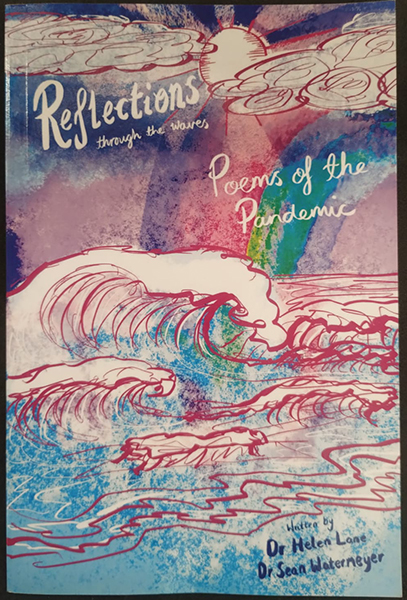
Reflections through the waves: poems of a pandemic
Reflections through the waves: poems of a pandemic, published 31 August 2021
Donated by HL, consultant, Wales
HL and a colleague working at a hospital in the South Wales Valleys published their feelings and personal experiences of working during the COVID-19 pandemic in this book. The summary on the back cover reads:
‘It was our catharsis, allowing a release of our emotions and helping us to cope with everyday life. It hopefully reflects the hardship, the suffering, the community spirit, the pulling together and the wonderful comradery experienced within our hospital and community.’
Profits from the sale of the book will be donated to the registered charities YoungMinds, Beat and 2 Wish Upon A Star.
It's good to talk
‘It’s good to talk’, 2021
Poem by HL, consultant physician, Wales
On Time to Talk Day (4 February 2021), a campaign created by the mental health charity Time to Change, HL published this poem. It asks the reader to recognise the people in hospitals who often go unnoticed.
HL, a consultant at the Royal Glamorgan Hospital in south Wales, wrote poetry ‘as a form of release when the emotional burden of the pandemic began to interfere with my ability to be a “normal” wife and mum […] I have only shared two publicly […] I was amazed at how many bereaved relatives replied, thanking staff looking after their loved ones when they couldn’t. That’s the thanks and recognition that NHS staff need right now.’
'It's good to talk'
I pray he survived
I rush to the ward
He tries to smile
My greatest reward.
His family so grateful
So precious, but faceless
Such emotion and fear
His survival is priceless.
I return to the office
I'll get through today!
Then flowers from the caring
Perhaps I can stay?
But all staff around me
So struggle each day
They suffer in silence
And dare they to say?
Such supportive staff
Vital cogs in the team
The grief they have witnessed
The things they have seen.
Who asks the porters?
Who hope for the best
Who cradle the sick
Then carry them to rest.
Who asks the domestics?
Who clean every space
After those who kept leaving
Having lost life's race.
Who cares for the caterers?
Who keep us all going?
Exposed to a risk
But carry on, knowing.
That we all need each other
Now, more than ever
And we may just survive this
But only together.
Transcript: LJS talks about ways of relaxing
LJS – Ways of Relaxing
It’s just been really hard, I mean, because, you know, what can you do? There’s only so much, so many things you can do at home, I mean. I tried to read but I just found I couldn’t really concentrate, although one of the only things I can read are murder mystery novels. Which I think is so interesting that I listened to a podcast called ‘She Done It’. And she talks about this as the kind of golden-age mysteries of like [Agatha] Christie and things, all were around the time when people had just experienced war and so were looking for some kind of stories that made sense of the world and murder mysteries really do that really well. So there’s a lot of threat, but they’re very well packaged into a neat logical order, with an outcome. That just really resonated so much, it’s like, you haven’t been really able to read much in terms of novels but I can read a murder mystery and it is so neatly packaged into this ordering of the chaos, so I think that’s one thing… And otherwise, on my days off, I would just always go for a walk. I’m lucky where I live it’s quite green. So, we have the docks, there’s a nature park and there’s some woods, and so my partner and I would go for a walk around the woods and just notice things like, when the allium comes out, or when the snowdrops arrive, or the fact that there’s a woodpecker that you can hear. There’s a city farm nearby, so we go visit the goats. [laughs] I really love the goats. And yeah, I think… I don’t know, I’ve noticed nature a lot more, I think, the last couple of years. When the trees blossom, it’s just, like, really noticeable, sort of passing of time in a way that again is kind of bigger than the chaos that you’re currently experiencing, so the fact that every year the blossoms come out at the same time. There have been some swans that have had cygnets, and then we’ve sort of watched them grow up and turn white, and now I can’t tell which are the swans are which are the cygnets, and that’s happened over the last year while… So, there’s just these things that are kind of happening separate from the chaos of our day-to-day lives. It’s a nice thing to contrast and to remember that, although this is all encompassing and very important right now, you know, the world sort of ticks on and carries on, and that this won’t be our life forever.
'Finally it gave us [a] feeling of work satisfaction and [we] felt proud for treating the challenging disease.’
Anon, respiratory medicine consultant, Midlands
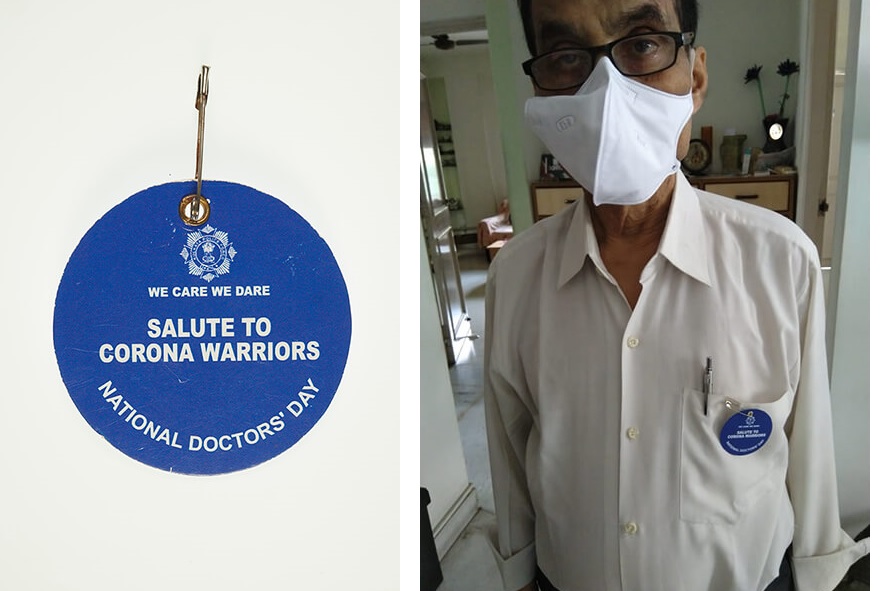
'CORONA Warriors’ badge; photograph of TKB wearing the badge
‘SALUTE TO CORONA WARRIORS’ badge; photograph of TKB wearing the badge, July 2020
Donated by the family of TKB, senior consultant physician, Kolkata
TKB worked at the Calcutta Medical Research Institute, Kolkata. On 1 July 2020 – National Doctors’ Day in India – TKB was given this badge by the Kolkata Police as a token of appreciation. TKB was photographed wearing the badge shortly before he died on 31 July 2020.
'I hope that we are listened to after this ends. Not called heroes or angels or clapped for or given badges or medals, listened to.’
Anon, respiratory FY1 (foundation year 1) doctor, Scotland

Pin badge of recognition given by Leeds General Infirmary
Pin badge of recognition given by Leeds General Infirmary
Donated by Leeds General Infirmary
Leeds General Infirmary gave these pin badges to staff to recognise the work they did during incredibly challenging circumstances. They were given to all staff working in the intensive care unit, including many volunteers.
The design of an owl was created by a local art student in Leeds. Owls are often depicted to represent wisdom, but they can also symbolise transformation, healing and good luck.
‘I found out I was pregnant with my second child just as the first lockdown was announced. At that time, we did not know whether COVID affected the foetus which was terrifying. Luckily my trust was very good at keeping myself and other pregnant staff members safe. We were pretty much sheltered within a week or so once COVID patients started appearing on all wards not just the red ones.’
Anon, elderly care specialist doctor, UK
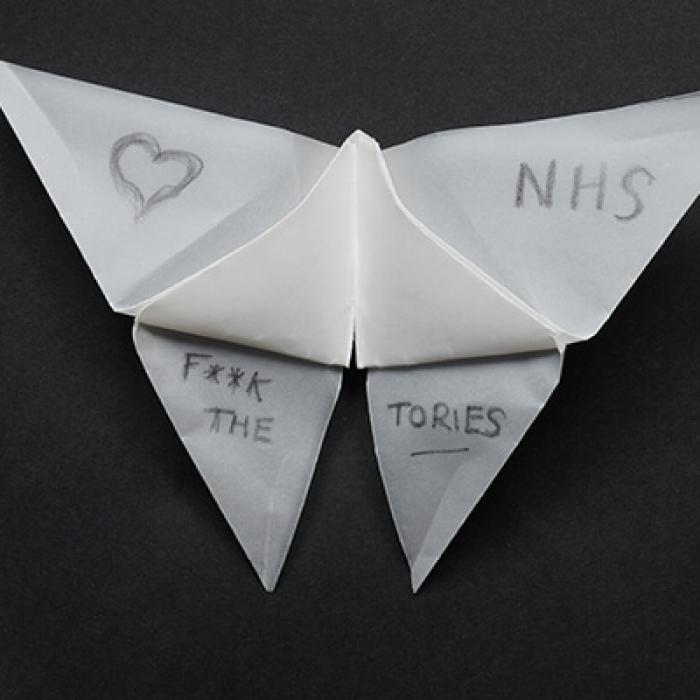
Origami butterfly with handwritten message on wing. F* the Tories.

Origami butterfly with handwritten thank you message on wing.

Origami butterfly with handwritten message on wing about unprecedented teamwork.
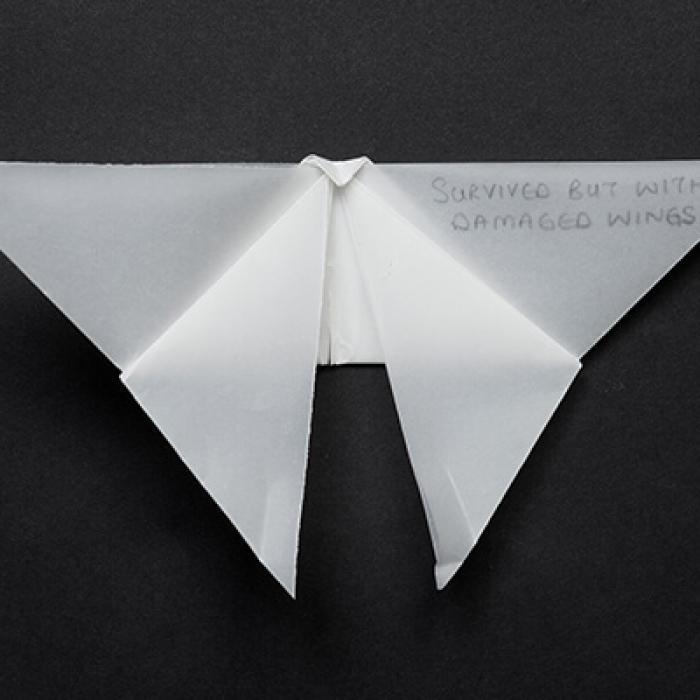
Origami butterfly with handwritten message on wing about survival.
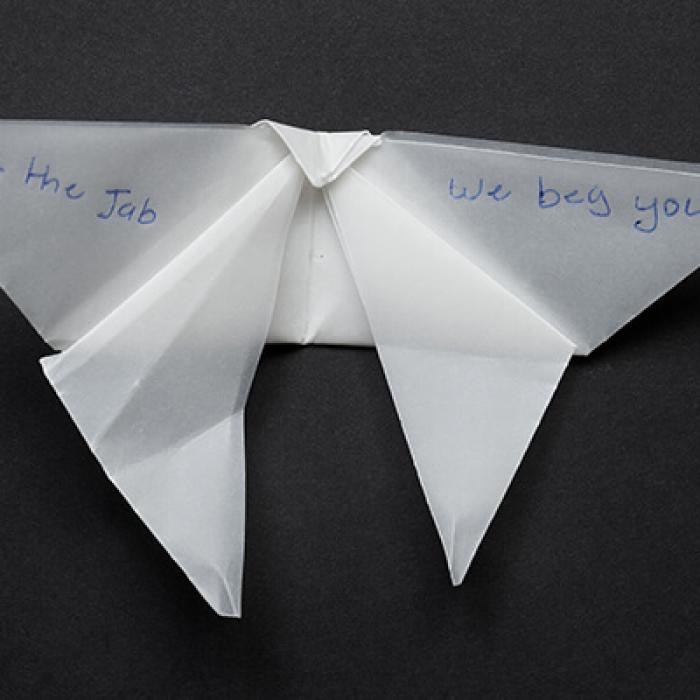
Origami butterfly with handwritten message on wing begging people to get the jab.
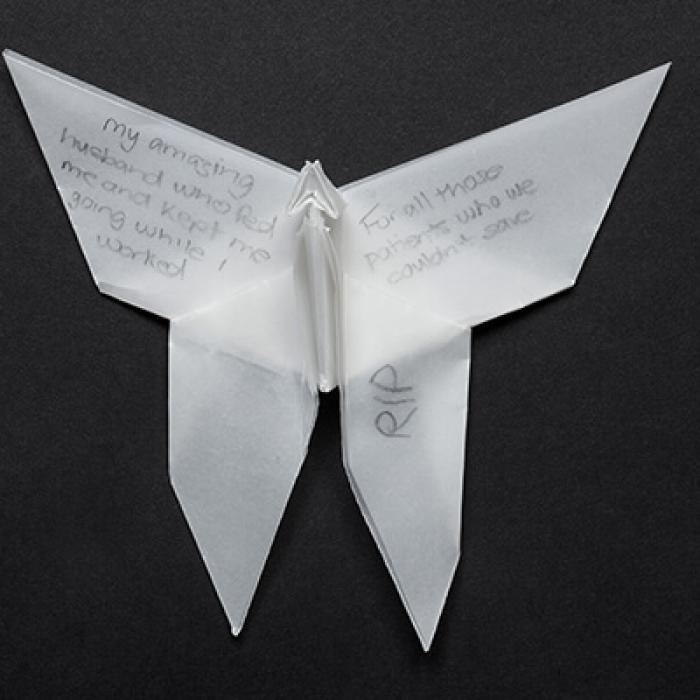
Origami butterfly with handwritten message on wing. RIP.
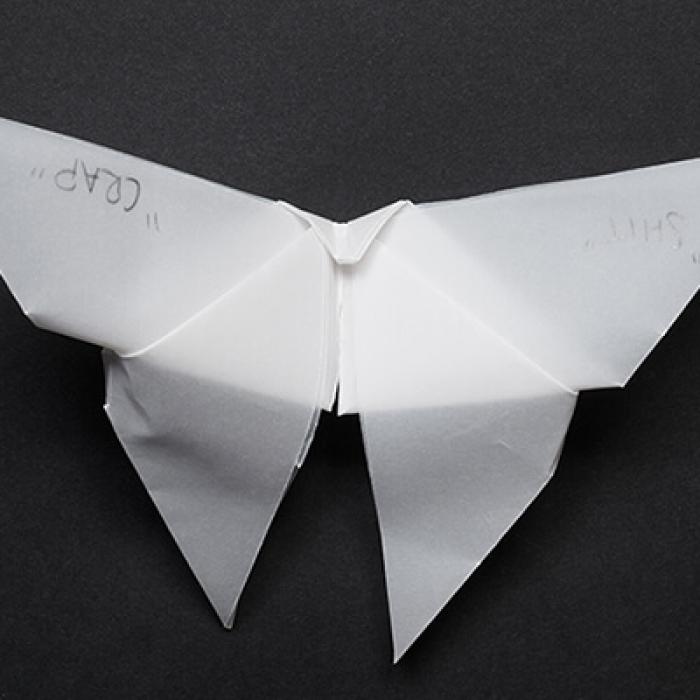
Origami butterfly with handwritten message on wing, crap.

Origami butterfly with handwritten message on wing about exhaustion.
Butterflies: ‘What we go through, together’
‘What we go through, together’
Donated by Leeds General Infirmary
In the autumn of 2021, the adult critical care team at Leeds Teaching Hospitals NHS Trust took part in a series of wellbeing reset days.
The reset days were intended to help staff prioritise their own wellbeing, following the enormous challenges they faced during the pandemic. They were run in partnership with wellbeing workshop providers Mind It and Optimus Team Learning.
Staff created 600 origami butterflies, each with a personal message. CB, lead quality nurse with the adult critical care team, described how ‘this project has given us an important chance to use art as part of our own healing process and to express our sadness, solidarity and hope in a unique and beautiful way.’
The trust’s aim was to give participants the opportunity to reflect on recent events and move forward. The trust hoped that the reset days would help each participant to feel and understand that leaders, colleagues and the trust acknowledged their dedication and experiences of working during the pandemic, and that the trust cared about them, valued them and wanted to thank them.
The butterflies were brought to life by a local artist, Aimee Grundell, in an exhibition ‘What we go through, together’, at Leeds City Museum. They have now been given to the RCP Museum.
‘I will never forget leaving the ward and my colleague hugging me tight, quite literally giving me a shoulder to cry on. The mutual support of colleagues is something I think has increased during the pandemic, and is an aspect of working in the NHS that I really cherish. Opening up about your feelings, and how events at work may have affected you, is incredibly important.’
KMH, associate inpatient contact tracer, north-east England and Yorkshire

Smile with your eyes
Smile with your eyes (2021)
Donated by RA, infectious diseases specialty doctor, Scotland
RA and a colleague at Raigmore Hospital wanted to showcase the poetry, prose and pictures created by staff across their NHS trust:
‘Creating this book has given us a chance to collate excellent pieces of artwork and writing from a variety of staff from NHS Highland, bringing us together as a team during these challenging times. The aim was to raise money to aid the global vaccine effort led by UNICEF but it has also given staff a creative outlet for the extraordinary stresses of the pandemic.’
As of December 2021, sales of the book have raised approximately £14,000 towards global COVID-19 vaccine distribution and provision. Copies of the book are available at the end of the exhibition.

CR, acute medicine consultant, north-east England and Yorkshire
Photograph by Jessica van der Weert
CR recalled the struggles of having a family while working during the pandemic, but also the comfort she found in the time she spent with her family:
‘By far the most emotionally exhausting part was juggling childcare and family life. My partner maintained our family life and initial home-schooling, he dealt with the kids’ emotions as I drove off to work and then wasn’t home for bedtime. A few weeks in, the reality hit that my 7-year-old daughter was petrified I would catch COVID and die; for days after that I cried driving into work. An emotion in my daughter that would reoccur and manifest itself in different ways in all subsequent waves.
‘I definitely overcompensated on my days off at home! Trying to be an amazing Mum and give our family as much fun as we could. I will look back fondly on those days though where we had some of our best ever family times despite the constraints of the pandemic […]
‘In those early days when this photo was taken I look tired, but that was because I had just finished a 13-hour shift. But I had energy, I had vigour and I could embrace everything that was thrown at me, and I think I did. My strongest memories will be around everyone just rallying and getting stuck in. The small things got set aside and we worked together as teams to do the best we could in the situation we faced.’
Wellbeing for Physicians film
Wellbeing for Physicians, 2020
Created before the January 2021 lockdown, this short film documents how three physicians took care of their own wellbeing while working through the COVID-19 pandemic.
Produced by the Royal College of Physicians in collaboration with New Leaf, for the RCP's annual conference 'Medicine' in 2021. .
Transcript: Wellbeing for Physicians
[Caption] This film was created before the January 2021 lockdown.
[Nick, Consultant and Clinical Lead speaking] 'You get in, your body goes into shock, you push all your blood to your core, and then you get a sort of, a reheating, and you feel alive.'
[Emily, ED consultant speaking] 'We weren't allowed to train indoors in the winter, we had to find somewhere else to train. If you have had a stressful day, it's just good to get out, it just relieves a lot of the stress, and I always come out after a cricket training session feeling happier.'
[Sunny, Respiratory & ICU Consultant speaking] 'My wellbeing, I attribute to my son, in many ways. It's almost like an early morning ritual. We'll just go around and see if any changes have happened.'
[Caption] Throughout 2020, the demands on the healthcare community have been extraordinary. Working in such challenging conditions, one's own wellbeing can feel like the last priority.
This is how three Physicians take the time to check in with themselves.
Nick, Consultant and Clinical Lead, Cold Water Conquerer.
'm the lowerground foor consultant, so I'm on call for all the medical admissions that come in today, and I'm looking after the short-stay patients on this area, which is the acute assessment unit. So that's my role today, so just to support the on-call team. We're a couple of doctors down, because of COVID, isolation, and lots of other issues, so it's about cross-covering.
'It's very hard to know if somebody has or hasn't got covid, so we manage people on a risk basis, as to whether you think they may or may not have COVID, but people who you would bet your house on don't have COVID, sometimes come back as COVID, and so it's how you manage that, and whether you think they're infected, then that's where difficulties come in. Everything just takes longer, at the moment everything's harder work. It's just different, everyone's life is different now, isn't it?'
[Caption] Emily, ED consultant, Budding Cricket Legend.
'I'm a consultant in emergency medicine, so that means I'm one of the consultants in the emergency department, so we just deal with anybody who comes to A&E really. We work in a really good team, I'm really lucky to work with lots of lovely consultants and a brilliant team of nursing staff as well. Everyone looks out for each other.'
[Emily speaking to patient] 'So what's happened then Mary, why did you have to come to hospital?'
[Patient] 'Oh, I tell ya, I went to the dentist...' [rest of response is obscured by Emily narrating].
[Emily narrating] 'Sometimes I think, actually, if you're able to go to work, it's quite a good thing because you're not at home all the time, you know, it's almost a bit of a privilege.'
[Emily speaking to patient] 'Who called the ambulance Mary?'
[Patient] 'Me, me daughter.'
[Emily speaking to patient] 'Your daughter, and does your daughter live with you?'
[Patient] 'Yes, she does... '[rest of response is obscured by Emily narrating]
[Emily narrating] 'Obviously it's really hard seeing poorly people, and it's really hard not being able to let their families in. I think that's one of the worst bits. It's stressful when you've got a loved-one in hospital, I know what it's like.'
[Caption] Sunny, Respiratory & ICU Consultant, Tree-planting Super Dad
'Last week, I was on the Intensive Care Unit, it's a 7 til 7 day, it's non-stop, looking after sick people who are critically ill, and I spend the rest of the time looking after patients with respiratory problems. It's tiring, there are long hours, there's a lot of scrutiny in terms of attention to detail, because as you know, COVID is new to many of us, the list doesn't seem to get any [laughs], doesn't seem to reduce with any speed.
'The onus is on us, as leads in departments and so on, to get out there and, for instance, you know, showcase tree planting. We're gonna go out and plant some trees in the grounds of Harefield, we're gonna have the company of the sunrise.'
[Caption] Karen, Head of Arts
'So Woodland Trust were gonna give us 420 trees, we've planted with staff, as volunteers to come into the ground, and we've had over a hundred people so far. They were doing it for a host of different reasons. So obviously their own wellbeing is one reason, a sense of wanting to mitigate the impact of COVID-19. And we are so lucky at Harefield, you know, we've got this pride of this green space, an amazing environment for patients' rehabilitation.'
[Nick speaking] 'Wellbeing is high on the agenda of the Trust, there's counselling available, and psychological support if required. My father was an in-patient with COVID a month or so ago, I was trying to manage that from a distance and being in the game almost makes it harder. I think we, as doctors, and men in particular, we're just not very good at looking after ourselves anyway. It can be difficult to try and juggle sometimes, and in fact being able to verbalise that and say that to my colleagues was really helpful at the time whereas previously I would probably have bottled it up and not told anybody anything.
'We set up an informal group of people swimming together, just so they'd know who else was here from work, because often you don't recognise people outside of their work uniform. If they get in under ten degrees they earn a royal freeze hat.'
[Woman speaking] 'When we get out of the water, we're like, all of us are just fizzing with excitement, and I don't think you would replicate that in a bunch of adults anywhere else really [laughs]'
[Emily speaking] 'The coach is like, "do you really wanna train outside?", and the whole team are like, "yeah yeah yeah, we wanna keep going". We're quite competitive [laughs].'
[Sunny speaking] 'People often say, "how do you destress?" or, "how do you wind down?", and my son Shevrun and I have been planting trees for the best bit of two and a bit years now. You come home and the first activity's almost let's go in the garden, and this just takes me away for a while.'
'Planting trees and talking about it everyday has now become a way of bonding. We now have two cherry trees, one peach, three plum, two grape trees, one walnut tree, a lemon tree...'[fades]
[Nick speaking] 'I've built this into my schedule before going to work in the morning. Time away from the world, I can get in here and forget about everything else.'
[Emily speaking] 'After the lockdown, we had our first training session, and I think it was like three degrees and raining, and we were outside. I was really tired, like oh god, can I really be bothered to get out there again, especially when it's freezing cold and raining. But once you're there, it's just a lot of fun.'
[Caption]
Film produced by The Royal College of Physicians in collaboration with New Leaf
Director Alex Blogg
Producer Oliver Burton
With thanks to
Dr Nick Murch Royal Free London NHS Foundation Trust
Dr Emily Hill Liverpool University Hospitals NHS Foundation Trust
Dr Sundeep Kaul Royal Brompton and Harefield NHS Foundation Trust
Drone operator Tobias Brent
Support
If you're having a hard time and want to talk to someone, whatever you're going through, you can get in touch with the Samaritans. Their helpline is open 24 hours a day, every day of the year.
You can:
-
call the Samaritans for free on 116 123
-
visit their website, click here
You can also find a branch of the Samaritans near you if you'd like to speak to someone in person.
Part of the exhibition Fortitude
Explore further:


